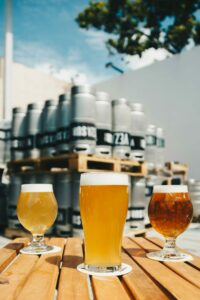Many wine education providers offer short wine courses while referring to them as oenology education. However, there is a significant difference between the two, as oenology is a scientific field. According to Larousse, oenology is the science that studies wines. It encompasses all the techniques of winemaking and the preservation of wines produced through this science. To become an oenologist in France, there is only one recognized diploma: the Diplôme National d’Œnologue (DNO).
In the wine industry in France, two types of education stand out: the Diplôme National d’Œnologue (DNO) and the Wine & Spirit Education Trust (WSET) wine education. While both programs provide access to careers in the wine industry, they differ considerably in terms of content, objectives, significance, and pedagogical approach.
An oenology education leading to the DNO is a lengthy university program that grants you the DNO. In contrast, WSET wine education or Wine Scholar Guild programs are shorter certifying courses that acknowledge specialization and expertise in specific wine knowledge areas. Therefore, the diplomas obtained are not the same. Are you confused? That’s normal. Let’s see why a WSET wine education differs from an oenology education in practice.
On Content: What are the differences between an oenology education and a WSET wine education?
One of the most significant distinctions between an oenology education and a WSET wine education or the Wine Scholar Guild is the content. The confusion often lies in the substance of the programs.
An oenology education primarily focuses on the science and techniques of wine production. Courses cover vineyard cultivation, vineyard management, harvesting, winemaking, fermentation, wine chemistry, cellar management, and winemaking equipment. Oenology education delves into the intricacies of wine production, including vineyard management, fermentation processes, laboratory analysis, and mastering analytical tasting techniques. Students learn to conduct physical, chemical, and microbiological analyses of wines. The goal is to equip students with the technical and practical skills needed to produce wine and become oenologists. The scientific component is substantial, unlike WSET wine education programs. Oenology education also includes a significant portion of quality control for the wine industry, focusing on environmental, health, and safety aspects.
WSET wine education, on the other hand, is more centered on studying and appreciating wines from around the world. It covers a broader range of topics, including wine tasting, production, wine regions, grape varieties, wine history, and food and wine pairing. WSET students learn to evaluate, appreciate, and communicate about wine. WSET wine education doesn’t limit itself to winemaking but aims to train versatile wine experts who understand wines from around the world, their styles, characteristics, and culture. Tasting is at the core of WSET wine education, and students are trained to objectively describe wine, analyze it, assess its quality, and rate wines.
Different Certification Levels
Another significant difference between the Diplôme National d’Œnologue and WSET wine education lies in the levels of certification obtained. The Diplôme National d’Œnologue (DNO) is a state-recognized, university-level, and professional diploma. This Bac +5 degree educates high-level technical professionals with a strong scientific component integrated into the program. Obtaining the DNO allows graduates to join the professional union of the Union des Œnologues de France. However, this diploma is primarily recognized in France, and its international recognition is more limited than that of WSET wine education, which is offered on five continents. WSET Level 4, or the Diploma, opens doors to the prestigious Master of Wine qualification. WSET wine education offers a comprehensive range of certification levels, from wine introduction with Level 1 to the WSET Level 4 Diploma in Wines. Each level has its requirements and content, allowing learners to progress gradually according to their needs and career goals. WSET wine certifications are internationally recognized and are often required for jobs in the wine and hospitality industry.
Different Audience for Different Careers
Oenology education is primarily designed to prepare students for careers in the wine industry as winemakers, oenologists, vineyard managers, cellar technicians, or production managers. Graduates of oenology programs or those with a DNO typically pursue careers directly related to wine production, as they have acquired essential scientific and technical skills required for creating quality wines.
With no specific scientific component, WSET wine education programs aim to train wine professionals such as sommeliers, restaurant managers, wine retailers, import-export experts, and passionate wine enthusiasts who wish to deepen their knowledge and understanding of wine. WSET wine education programs are designed to meet the needs of a diverse audience, ranging from novices to experts. WSET learners gain a comprehensive understanding of wines from around the world, their characteristics, regional specificities, and history. They also learn to objectively assess wines, use precise language to describe tasting sensations, and recommend appropriate food and wine pairings. They develop expertise in wine tasting and the ability to serve and advise clients.
The pedagogical approach also differs because the objectives are different. In addition to differences in content, both types of programs also adopt different pedagogical approaches. The DNO relies on traditional teaching methods, including lectures, laboratory work, and cellar internships. Students receive intensive practical training. The pedagogical approach of the DNO is deeply rooted in French winemaking tradition and emphasizes the transmission of practical and technical skills.
WSET wine and spirits education programs are more focused on practical learning, especially wine tasting. For some WSET levels, learners are immersed in vineyards to become familiar with winemaking and viticulture processes firsthand. The WSET program includes wine tasting sessions, and graduates will be able to systematically analyze and evaluate wines. They will be proficient in accurately and expertly assessing the color, nose, and palate of wines.
In summary, there are indeed differences between an oenology education and a WSET wine education. The diplomas and certifications obtained offer different career opportunities. The expertise acquired is not quite the same. WSET wine education offers a comprehensive approach to wine, including tasting, and is recognized internationally. The choice between the two types of education, oenology or WSET wine education, depends on personal goals, the desired career path, and the level of expertise sought in the field of wine.








